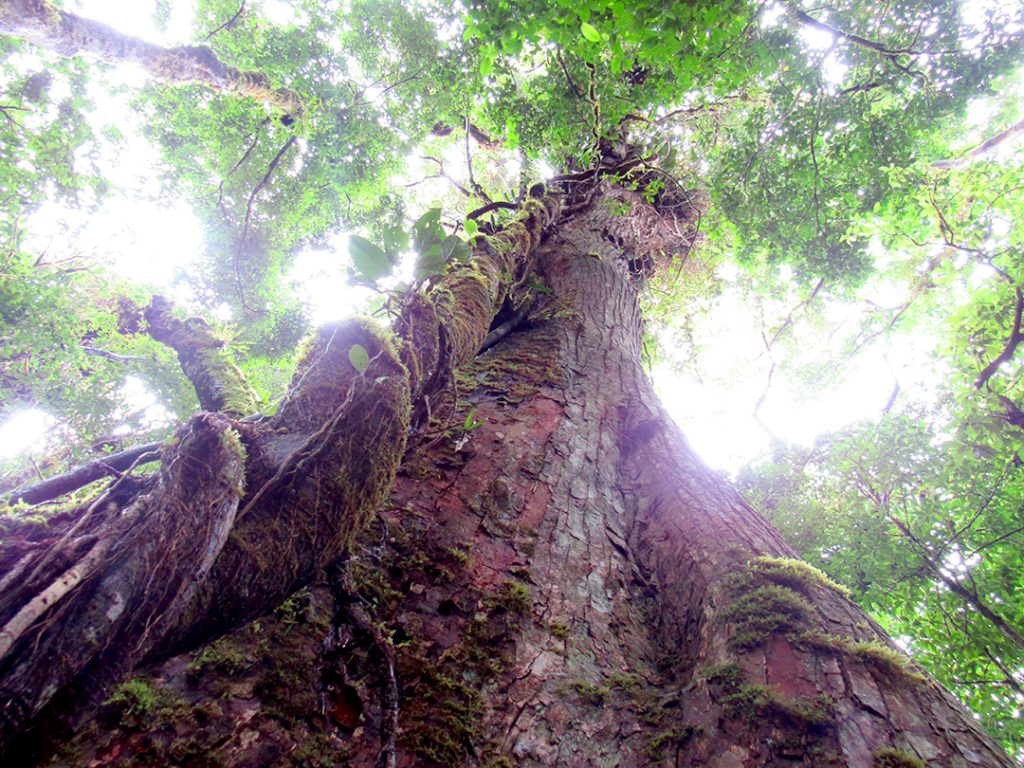
Costa Rica is such a magical place, I found myself thinking over and over. I mean, even the entrance to the Monteverde Cloud Forest Preserve was enchanting! The day was cool, and fog swirled between and beyond the many trees that towered over our group. We were in particularly high spirits at that time—in our presence was an extraordinarily fluffy dog aptly called ‘Sugar Bear’ that we all took turns petting as we got to know a bit more about the renowned naturalists who would be accompanying us on our walk: Mark Wainwright, author of the Natural History of Costa Rican Mammals, and Ricky Guindon, bird expert and son of the Quaker founders who settled in the area in the 50s.
These cars have people, and these people have money that they use to pay admission to these forests, and that money funds the protection and conservation of the forests, and these forests are the homes of hummingbirds—and hundreds and hundreds of other species. Conservation, I remembered, can sometimes be messier and more complex than one might think.
We were all set to go inside, but just as we made motions to enter the preserve, a family frantically called us over to their car; a pair of hummingbirds had crashed into the car windows and dropped to the ground. Ricky and Mark were quick to go over and scoop the small birds up in their hands. We crowded around the two to get a closer look.
“Will they die?” I asked Mark.
“I think they might be there, already,” he replied gravely.

My throat tightened, and I felt my eyes welling up. Christina, don’t you DARE start sobbing in the presence of these guys, I mentally screamed to myself. To see a creature that is normally so spirited and animated lie so, so still, was painful.
The female of the pair turned out to be alive. After a few minutes in Ricky’s hand, she flew away, over our heads and into the forests. The male, however, was not as lucky, and died in Mark’s palm. While explaining to us the iridescent nature of its feathers, he held the body up higher and the bird’s little neck lolled over in a very disturbing manner. I winced and turned away, feeling anger flow into me. How could this have happened? If that car hadn’t been there, the birds would have been just fine! This is their fault—I stopped myself. No, it wasn’t really that family’s fault. The car was there, but so were others, and there would be many, many more—the Reserve gets about 70,000 visitors a year. And these cars have people, and these people have money that they use to pay admission to these forests, and that money funds the protection and conservation of the forests, and these forests are the homes of hummingbirds—and hundreds and hundreds of other species. Conservation, I remembered, can sometimes be messier and more complex than one might think.
As we walked inside the reserve, I remembered what I had written in my application to this DukeEngage program; I had acknowledged that environmentalism wasn’t always black and white, and sometimes conservation efforts have both benefits and drawbacks. The rise of ecotourism, for example, has brought on an increase in funding and support for the preservation of the natural world, but research has also found that it endangers wildlife in that it causes animals to feel more accustomed to and unafraid of humans who could potentially harm them. I even mused on all of the fuel and energy that went into flying us over here so that, ironically, we could plant trees and help in conservation efforts.
It seems a lot like the ‘right’ relationship between nature and human is still a fuzzy concept. I’m feeling receptive and open-minded, however, and look forward to the roughly two months we have ahead of us to learn. It’s likely that we won’t come home with crystal clear answers on exactly how one should go about protecting the Earth without inadvertently harming it. But I think the fact that we’re paying attention is a good start. Whatever I do learn from Costa Rica’s lush forests, colorful birds, and people who work tirelessly to protect it all, I hope to use and apply to my own efforts to develop and maintain a symbiotic relationship with the Earth. May we return with wisdom, ideas, and outlooks that will enable us to make a difference on campus, at home, and beyond.
